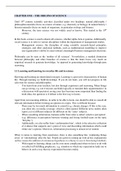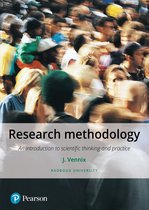CHAPTER ONE – THE ORIGINS OF SCIENCE
Until 19th century scientific activities classified under two headings: natural philosophy /
philosophia naturalis (focus on science of nature, e.g. chemistry or biology) & natural history /
historia naturalis (focus on study of organisms, in particular zoology and botany).
- Moreover, the term science was not widely used or known. This started in the 19th
century.
In this book, science is used to denote all sciences, whether alpha, beta or gamma. Additionally,
social science is to refer to various disciplines within the department of management studies.
- Management science: the discipline of using scientific research-based principles,
strategies, and other analytical methods, such as mathematical modelling to improve
any organization’s ability to enact rational, meaningful business management decisions.
Philosophy can be seen as the ‘mother of all sciences’. Nevertheless, a marked distinction
between philosophy and other branches of science is that the latter focus very much on
empirical research to generate knowledge. As opposed to generating knowledge through pure
reasoning.
1.1 Learning and knowing in everyday life and in science
Knowing and learning are interrelated concepts. Learning is a pervasive characteristic of human
life. Through learning we build knowledge. If you do not learn, you will not progress in life
(also true for science and philosophy).
- You learn from your teachers, but also through experience and reasoning. Many things
can go wrong, e.g. not everyone can think logically or translate their argumentation / in
a discussion with spectators saving your face becomes more important than finding the
truth (thus, the question is if debate is the best way to learn).
Apart from our reasoning abilities, in order to be able to learn, one should be able to consult all
relevant information before forming an opinion on a topic. This is difficult because:
- There may be too much information to consult (e.g. climate change). If this is the case,
you often rely on media coverage, which is often tainted. Different news outlets often
report; (a) on different subjects (b) different on the ‘same’ subjects.
- When consulting information, humans suffer from what is called ‘selective perception’.
(e.g. difference in perception between winning and losing football team on the topic
‘fair play’).
- Additionally, we also suffer from ‘conformation bias’, which is the selective collection
of evidence that supports one’s point of view and discarding information which could
refute one’s opinion. Moreover, information processing is almost never neutral.
When it comes to learning from experience, there is also something like ‘explaining things
away’ or ‘rationalising’ after the fact. People are good in coming up with ad hoc explanations
(ad hoc means the addition of extraneous hypotheses to a theory to save it from being falsified).
- With regard to learning, things can be even more complicated when we have to do with
so-called self fulfilling prophecies, e.g. situation in which my expectation leads me to
behave in such a way that my expectation becomes reality.
,Learning plays a large role in science: without learning there will be no progress in science.
Nevertheless, individual learning is highly different from learning in science since science
includes new knowledge.
In the first chapters, learning by trial and error in science will be discussed, which shows: (1)
science is a cumulative effort, (2) progress can be slow but then suddenly make a breakthrough,
(3) progress can be very powerfully halted by preconceived ideas, (4) it shows a number of core
concepts of science in action, and (5) linked to the previous point, that ideas about how to
conduct scientific research and acquire knowledge changed over time in remarkable way and
resulted in ‘the scientific’ method.
1.1.1 Typical characteristics of philosophers and scientists.
(1) Curiosity, or wondering about the world. But curiosity, although a necessity, is not a
sufficient condition. Many people are curious and would not make good philosophers or
scientists. Thus, they miss; (2) Scepticism and; (3) Perseverance. (4) Without thinking there
will not be any progress in science or philosophy. But apart from analytical or logical thinking,
many also excel in creative thinking.
1.2 Ancient Greece as the cradle of western science.
Now taking a look at the history of science, i.e. astronomy. Each old civilisation had a particular
body of knowledge (tradition). The Greeks (around 2500 years ago) began to look for rational
explanations of the phenomena they observed. In addition, they were the first to pursue
knowledge for its own sake.
1.2.1 Plato and Aristotle.
When it comes to knowledge and how to acquire it, both philosophers held diametrically
opposed views. (1) Plato, the a-priori thinker: ‘who tries to fit nature to a preconceived
intellectual scheme’. (2) Aristotle: ‘who constructs his intellectual scheme to fit what is
observed in nature.’
1.2.2 Ptolemy’s model of the universe
For the ancient Greeks two geometrical forms were perfect, i.e. the circle and the sphere.
However, Aristotle’s and Plato’s view were not consistent with the observed motion of the
plants, the most conspicuous being the fact that several plants normally seemed to move
forward, but occasionally seemed to move backward.
1.3 Why the Greek civilisation (as the first scientists)?
To answer this question, we have to keep in mind that science in those days primarily related
to such domains as astronomy, physics and medicine. (1) According to the philosopher Karl
Popper, the Greeks introduced a tradition of critique. (2) In comparison to the Chinese
civilisation, the art of persuasion was mainly used by advisers of the emperor here. As a result,
Greek philosophers were quite independent as to their rulers.
,CHAPTER TWO – THE SCIENTIFIC METHOD
First, let us make a distinction between two types of knowledge, after Aristotle. (1) knowing
‘what is the case’ (or ‘that something is the case’). (2) knowing why this is the case. In modern
day research language: (1) descriptive, and (2) exploratory knowledge.
2.1 Deduction, induction, and abduction
Even if we do not use or know these three terms, we use their strategies in our daily lives. All
three strategies find their origin within Aristotle.
2.1.1 Deduction
We have to look at two aspects of deduction. (1) as a form of argument (deductive logic), (2)
as a form of science (deductive science).
To start, deductive logic. This works from the universal / general to the individual / specific.
The most famous example is the syllogism, developed by Aristotle. It is a form of argument
which consists of two premises (P) and one conclusion (C). An example is:
- All humans are mortal (P1)
- X is a human (P2)
- X is mortal (C)
In the first premise humans are the subject, to which a predicate (being mortal) is added.
Moreover, in a syllogism the conclusions follow by necessity from the premises. If the premises
are true (i.e. correspond to a state of affairs in reality) then the conclusion must also be true.
That is the strength of the syllogism and deductive reasoning, as opposed to induction and
abduction. Nevertheless, it has also been criticized because the conclusion of a syllogistic
argument is ‘included’ in the premises.
➔ It is important to keep in mind that (formal) logic is a branch of philosophy as such is
not concerned with the truth of premises and conclusions, it focusses primarily on the
question whether a particular argument is valid or not, i.e. whether the conclusions
follow logically from the premises (dog with five leg example, which is a valid
argument). Moreover, a sharp distinction needs to be made between a valid argument,
and a true conclusion.
Apart from a deductive argument another important form of argument is the ‘material
implication’. It has the following conditional form (p → q). This can have four different
situations, which are:
1. P is true / does hold. - if p then q - p holds - therefore q
Modus ponens (mode that affirms): Whatever one substitutes for p and q, the argument will
always be valid. For example: When it rains the street gets wet; it rains; conclusion: the streets
get wet.
2. P does not hold - if p then q - not p - therefore not q
Denying the antecedent (not p): a fallacious argument. For example, it has not been raining does
not follow that the streets will not be wet, they could be wet due to some other factor.
3. Q does hold - if p then q - q holds - therefore p
Affirming the consequent (q): a fallacious argument, which is caused by the fact that p is
considered to be a necessary condition, rather than a sufficient one. For example, after all it
, does not have to rain for the streets to get wet, and if the streets are wet there are other potential
causes for it than rain. Both point 3 and 4 are cases of ‘non sequitur’, Latin for ‘it does not
follow’.
4. Q does not hold - if p then q - not q - therefore not p
Modus Tollens (mode that denies): Again, whatever the substitutes for p and q are, the argument
will always be valid. For example: When it rains the streets get wet; the streets are dry;
conclusion: it does not rain.
Next, deductive sciences. Deduction as a way of thinking plays a part in almost every branch
of science, but there are not many branches that are completely deductive (most well-known:
mathematics and logic). Deductive sciences do not take empirical phenomena as their point of
departure, but rather start from particular axioms (or postulates), which are considered more or
less evident: they do not need proof to be accepted as true (e.g. humans are evil creatures).
The fact that the building of knowledge of a deductive science is so certain (provided the axioms
are true and the proofs correct), has led some philosophers to apply this axiomatic deductive
method, particularly those who do not have confidence in sensory perception as the source for
knowledge.
Shortcomings of Human inquiry in general. (1) inaccurate observations. E.g. people don’t
explain what they see, they explain what they think they see. The picture in the slides with the
triangles. (2) Overgeneralizations, or ‘fooled by randomness’. E.g. women are better at
multitasking than men. (3) Selective perception / observation. (4) Illogical reasoning.
Two related aspects: Authority and Tradition. Both might be helpful or an obstacle for
scientific work. Authority might help to steer your research in the right direction, but also hinder
you to develop your own ideas. Tradition is helpful to stand your ground as the public opinion
does not agree with your ideas or way of working, but tradition might hinder your work because
of promoting ‘no-go’ areas of research.
Empirical statements: Statements which are beyond of what can be observed by the physical
senses (e.g. meaning of life). They cannot be observed or tested.
2.1.2 Induction
Parallel to deduction, induction can be seen as a form of argument (inductive logic), but also as
a way of conducting science (inductive science).
To start, inductive logic. In methodological terms induction means going from the specific to
the general, from observing a set of empirical phenomena to a general statement. For example,
after having seen all kinds of cars, I conclude that all cars have four wheels. Moreover,
induction is not specific for science, we use it in our everyday life. As pointed out by Aristotle,
induction is a way of gaining knowledge. Nevertheless, its shortcomings are that it does not
lead to general statements of which can be certain. In that respect, we have to make a distinction
between two forms of induction.
1. Complete induction: knowledge based on complete induction is quite certain, because
we have studied all objects (x) pertinent to the statement. Nevertheless, we could have
a similar criticism to it as syllogism: the conclusion does not contain much new insight.
o All x have been studied






